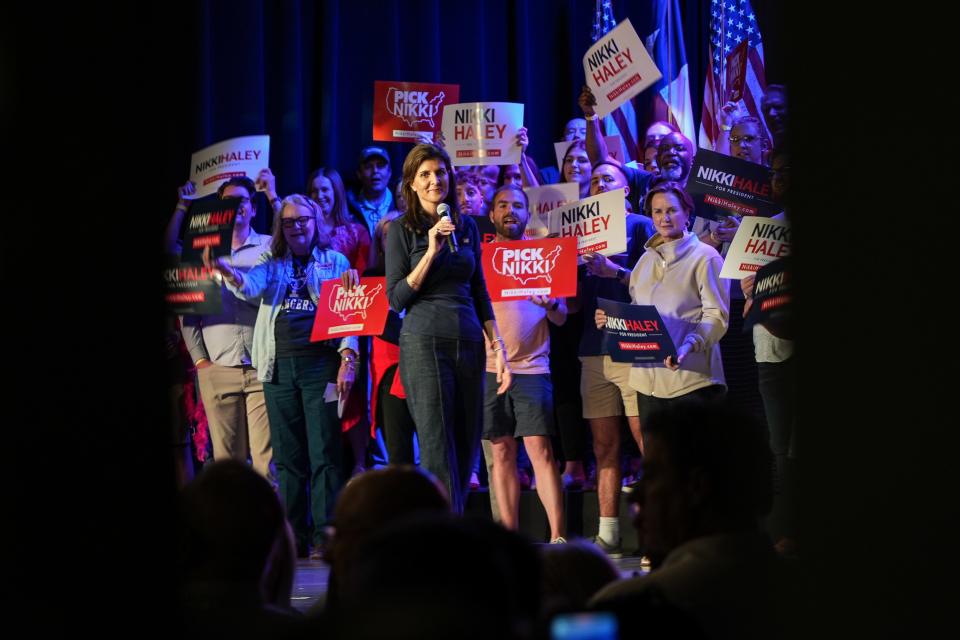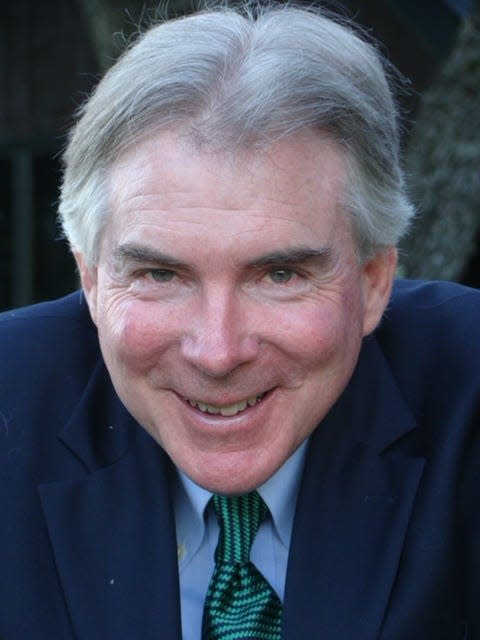'I could never vote for Donald Trump': Some Haley voters spurning GOP nominee
- Oops!Something went wrong.Please try again later.
- Oops!Something went wrong.Please try again later.
- Oops!Something went wrong.Please try again later.
John MacGovern is a realtor in Vermont. Jayne Crosby Giles works with nonprofits in Maine and Krista Moore is a retiree in North Carolina. While they live far apart, they have a few things in common.

All are longtime Republicans who backed Nikki Haley in her presidential bid. All held leadership positions in her campaign. And all three are deeply skeptical of Donald Trump, or outright opposed to him.
MacGovern won’t vote for Trump. Giles doesn’t see herself supporting Trump this time after casting ballots for him twice. While Moore – also a two-time Trump voter – said she is leaning against backing him again, calling him a “self-serving narcissistic and a bully and he is not the role model I want for my children and grandchildren.”
Now that Haley has exited the GOP presidential primary on the heels of big losses on Super Tuesday, attention is turning to Trump’s general election campaign and whether he can unite the GOP behind him to take on President Joe Biden.
Haley demonstrated in state after state that a significant minority of primary voters wanted a candidate other than Trump, and the question is whether they will accept the polarizing former president as their nominee.
The answer for some is an emphatic no.
“I could never vote for Donald Trump,” MacGovern said.
Haley’s departure from the 2024 race punctuated a series of favorable campaign developments for Trump. He's cemented a remarkable political resurrection after his failed 2020 campaign and efforts to overturn that election, which culminated when a mob of Trump supporters stormed the U.S. Capitol on Jan. 6, 2021 to stop Congress from certifying President Joe Biden’s victory.
Trump has easily dispatched his GOP challengers and also benefited from a pair of Supreme Court actions, one delaying his trial on charges related to Jan. 6 and another ruling that state officials can’t remove him from the ballot by claiming his actions on that day violated the 14th Amendment to the U.S. Constitution.
Meanwhile, recent polling has shown Trump ahead of Biden in key swing states.
Yet despite his primary dominance, there are lingering questions about the strength of Trump’s coalition as the general election kicks off.
Trump protest votes
That Trump almost certainly would be the GOP nominee has been clear for months, with polls and election results showing his command of the Republican base.
Yet many primary voters still felt compelled to register their disapproval.
Haley won two primaries – Vermont and Washington D.C.
More interesting, however, is that in the contests she lost, she was able to get 30% or more of the votes.
That's the case in at least six of them – New Hampshire, Nevada, South Carolina, Utah, Massachusetts, Virginia and Colorado − according to early vote totals, some of which are incomplete, and 20% or more in at least 13. (Votes are still being counted in some states.)
Exit polls show that many of Haley’s votes amounted to protest votes against Trump.
“What the results tell me is much less about Nikki Haley and more about Donald Trump,” said former Republican National Committee Political Director Mike DuHaime. “And that is there is still a significant number of Republicans who are dissatisfied, and that’s probably not a strong enough word. They just don’t like him.”
Haley received 35% of the vote in Virginia on Super Tuesday and an exit poll found that 60% of Haley’s Virginia voters said they mainly were voting against Trump. Virginia has an open primary, though, and most of Haley’s voters identified as independents or Democrats. She won 19% of Republicans in Virginia.
Asked if they would vote for the GOP candidate in the general election regardless of who wins the nomination, about a third of primary voters in each of the three Super Tuesday states where exit polls were conducted – California, Virginia and North Carolina – said no.
DuHaime and other top GOP consultants believe Trump should be worried about Haley’s vote totals.
“The high command of Team Trump ought to be concerned about unifying the Republican Party,” GOP strategist Karl Rove, a key adviser to former President George W. Bush, said on Fox News as Super Tuesday results were being tallied.
There is nothing Trump can do to convince some Republicans to back him, though.
Haley voters voice concerns about Trump
MacGovern, 71, has been involved with the Republican Party since graduating from Dartmouth College in 1980, serving as a Republican member of the Massachusetts House of Representatives and currently as a Republican town committee and county party chair in Windsor County, VT.
In 2012, MacGovern ran as the Republican nominee against Vermont U.S. Sen. Bernie Sanders and lost.
MacGovern gravitated toward Haley because “she doesn’t have the baggage that Donald Trump has.” He served on her leadership team in Vermont.
A self-described “William F. Buckley-Reagan Republican,” MacGovern said he believes in small government, personal responsibility, a strong border and a strong military and doesn’t view Trump as representing conservative values.

MacGovern didn’t vote for Trump in 2016 or 2020 and the events of Jan. 6. further cemented his view that Trump is “unfit for office.”
“When someone who's the President of the United States tries to remain in office after they’ve been defeated, to me that’s totally unacceptable behavior and disqualifies them from serving in elected office,” he said.
Jan. 6 also was a turning point for Giles, a former Republican member of the Maine House of Representatives who co-chaired Haley's Maine leadership team, in her support for Trump after she cast two ballots for him.

When Trump first ran for president, Giles said she liked his strong stance in favor of bringing American jobs back from overseas. His message was compelling for a lifelong Mainer who had watched jobs leave the state.
A Republican since she first could vote, Giles said she “enthusiastically” backed Trump in 2016 and a “little reluctantly” in 2020 but doesn’t expect to support the Republican nominee in this election. She has lost before and finds Trump’s actions after he lost in 2020 unacceptable.
“For him to deny the election results and stir up the country on the whole thing, and there’s still some legal stuff that’s following him on that, that’s not an individual who I will support for president,” she said.
Moore had voted for Republicans but wasn’t involved in politics before she began working on Haley’s campaign more than a year ago.
“Something stirred within me,” she said of Haley’s campaign. “Her message just clicked with my values on such a deep level. She wasn't just talking about politics; she was talking about bringing people together, cutting through all the division we're seeing nowadays.”
Like Giles, Moore happily backed Trump in 2016. In 2020, she “held my nose” and voted for him again.
Asked if she is considering voting for him in 2024, Moore said “not at this time” but added "there is a possibility, depending on his future actions, rhetoric, and campaign, especially in his treatment of Nikki Haley."
“His behavior and how he treats people is unacceptable,” said Moore, who was chair of Haley’s campaign in North Carolina.
DuHaime said Trump has “a real problem” with Haley voters and should be especially concerned about losing supporters such as Giles and Moore who voted for him twice.
“He lost last time,” DuHaime said. “He didn’t have enough voters to begin with, and when you don’t have enough voters to begin with and you start giving them away that’s a bad sign.”
Rove noted that Trump’s “tone” toward Haley supporters could be important if he wants to unify the GOP.
Haley supporters say Trump has alienated them with comments about her and perceived threats toward those who back her.
Haley didn’t immediately endorse Trump after dropping out, saying: “It is now up to Donald Trump to earn the votes of those in our party who did not support him, and I hope he does.”
Trump took a shot at Haley as she was leaving the race, saying she “got TROUNCED last night, in record setting fashion” and adding that much of her money and votes came from “Radical Left Democrats.”
Can Trump unify party?
Some Haley supporters are falling in line behind Trump, such as Michigan Republican State Rep. Mark Tisdel, who served on her leadership team in his state.
Tisdel said he backed Haley because he admires her record. He doesn’t like Trump’s insults and finds some of his behavior divisive and “beneath presidential demeanor” but added that it’s “nothing new, that’s just par for the course for him.”
Tisdel said in an interview before Haley dropped out that he would back Trump if he wins the nomination and doesn’t expect him to have much trouble unifying the party. Issues such as inflation and the influx of undocumented migrants across the U.S. border with Mexico ultimately will cause Republicans to rally around Trump, Tisdel said.
Top Trump adviser Chris LaCivita also shrugged off concerns about party unity when asked whether it would be an issue for Trump.
"We start from a position of strength in that regard because when you're winning states 70, 80, 90 percent of the vote I'd say that's pretty unified,” LaCivita said on Super Tuesday before Trump’s Mar-a-Lago speech.
Rep. Byron Donalds, R-Fla., said, “elections are always about choices” and predicated that Haley supporters ultimately will back Trump when confronted with the choice between him and Biden.
“I think our voters are coming home in November and I believe a lot of independents and some Democrats are gonna come to our side as well,” Donalds said in an interview at Mar-a-Lago.
Trump's struggles to unify the GOP are nothing new. He has feuded with Republicans at all levels for years. Some Republicans abandoned him in 2016 after the Access Hollywood tape came out, and he won anyway.
Biden has his own problems this cycle unifying Democrats, who polls show are concerned about his age and issues such as the Israel-Hamas war. He is struggling to keep his winning coalition from 2020 together, with minority voters a particular concern.
DuHaime said polls showing Trump faring well against Biden are more a reflection of “Biden’s weakness” than “Trump’s strength.”
Yet Biden’s campaign released a memo after Super Tuesday saying they are “consolidating their coalition,” pointing to overwhelming primary victories against nominal opposition, while declaring that Trump’s “primary performances are a major warning sign for the GOP, and an opportunity for President Biden to expand his coalition.”
Biden also made a direct appeal to Haley voters, saying: “Donald Trump made it clear he doesn’t want Nikki Haley’s supporters. I want to be clear: There is a place for them in my campaign.”
Giles said she is "looking into" all of the candidates other than Trump, while Moore said she would consider voting third party.
MacGovern long ago gave up on Trump, but he’s still working to elect Republicans down ballot.
“I’m a Republicans through and through,” MacGovern said. “And I’m not going to let a guy who never should have got over the fence take over the party, which is happening at the moment, but I’ve been through ups and downs in this business and try to sit it out and see what happens once he’s defeated in November.”
Zac Anderson is Campaign 2024 reporter covering Donald Trump and Republicans for USA TODAY.
This article originally appeared on USA TODAY: Donald Trump could struggle to unify GOP after defeating Nikki Haley
